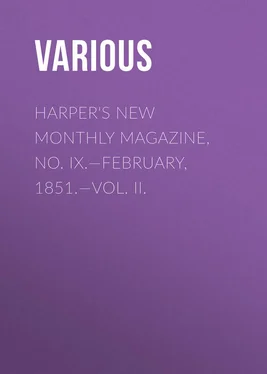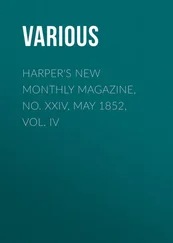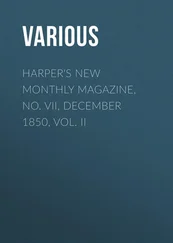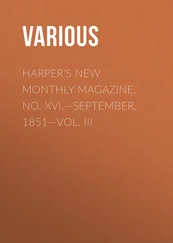Various - Harper's New Monthly Magazine, No. IX.—February, 1851.—Vol. II.
Здесь есть возможность читать онлайн «Various - Harper's New Monthly Magazine, No. IX.—February, 1851.—Vol. II.» — ознакомительный отрывок электронной книги совершенно бесплатно, а после прочтения отрывка купить полную версию. В некоторых случаях можно слушать аудио, скачать через торрент в формате fb2 и присутствует краткое содержание. Издательство: Иностранный паблик, Жанр: periodic, foreign_edu, на английском языке. Описание произведения, (предисловие) а так же отзывы посетителей доступны на портале библиотеки ЛибКат.
- Название:Harper's New Monthly Magazine, No. IX.—February, 1851.—Vol. II.
- Автор:
- Издательство:Иностранный паблик
- Жанр:
- Год:неизвестен
- ISBN:нет данных
- Рейтинг книги:4 / 5. Голосов: 1
-
Избранное:Добавить в избранное
- Отзывы:
-
Ваша оценка:
- 80
- 1
- 2
- 3
- 4
- 5
Harper's New Monthly Magazine, No. IX.—February, 1851.—Vol. II.: краткое содержание, описание и аннотация
Предлагаем к чтению аннотацию, описание, краткое содержание или предисловие (зависит от того, что написал сам автор книги «Harper's New Monthly Magazine, No. IX.—February, 1851.—Vol. II.»). Если вы не нашли необходимую информацию о книге — напишите в комментариях, мы постараемся отыскать её.
Harper's New Monthly Magazine, No. IX.—February, 1851.—Vol. II. — читать онлайн ознакомительный отрывок
Ниже представлен текст книги, разбитый по страницам. Система сохранения места последней прочитанной страницы, позволяет с удобством читать онлайн бесплатно книгу «Harper's New Monthly Magazine, No. IX.—February, 1851.—Vol. II.», без необходимости каждый раз заново искать на чём Вы остановились. Поставьте закладку, и сможете в любой момент перейти на страницу, на которой закончили чтение.
Интервал:
Закладка:
AN INVITATION TO THE ZOOLOGICAL GARDENS
I have found out a gig-gig-gift for my fuf-fuf – fair,
I have found where the rattle-snakes bub-bub – breed.
Won't you c-c-c-come, and I'll show you the bub-bub – bear,
And the lions and tit-tit – tigers at fuf-fuf-fuf – feed.
I know where c-c-c-co – cockatoo's song
Makes mum-mum-mum – melody through the sweet vale;
Where the m – monkeys gig-gig – grin all the day long,
Or gracefully swing by the tit-tit-tit-tit – tail.
You shall pip-pip – play, dear, some did-did – delicate joke,
With the bub-bub – bear on the tit-tit – top of his pip-pip-pip – pole;
But observe, 'tis for-for-for – bidden to pip-pip – poke
At the bub-bub – bear with your pip-pip – pink pip-pip-pip-pip – parasol.
You shall see the huge elephant pip-pip-pip – play;
You shall gig-gig-gaze on the stit-tit – ately racoon,
And then, did-did – dear, together we'll stray,
To the cage of the bub-bub – blue fuf-fuf-fac'd bab-bab-bab – boon.
You wish'd (I r-r-r – remember it well,
And I l-l-l-lov'd you the m-m-more for the wish)
To witness the bub-bub-bub – beautiful pip-pip – pel-
ican swallow the l-l-live l-l-l-little fuf-fuf – fish.
Then c-c-ome, did-did-dearest, n-n-n-never say "nun-nun-nun-nun – nay;"
I'll tit-tit-treat you, my love, to a "bub-bub-bub – buss,"
'Tis but thrup-pip-pip-pip – pence a pip-pip – piece all the way,
To see the hip-pip-pip – (I beg your pardon) —
To see the hip-pip-pip-pip – (ahem!)
The hip-pip-pip-pip – pop-pop-pop-pop – (I mean)
The hip-po-po-po – (dear me, love, you know)
The hippo-pot-pot-pot – ('pon my word I'm quite ashamed of myself).
The hip-pip-pop – the hip-po-pot.
To see the Hippop – potamus.
DEATH OF HOWARD THE PHILANTHROPIST. 1 1 From "John Howard and the Prison World of Europe."
On the 5th of July, 1789, Howard quitted England to return no more. Arriving at Amsterdam on the 7th, he proceeded by slow stages through Germany and Prussia into the empire of the Czar, which he entered at Riga. He was destined never more to quit the soil of Russia. The tremendous destruction of human life to which the military system of that country gives rise, had not then, as it has since, become a recognized fact in Western Europe; and the unconceived and inconceivable miseries to which Howard found recruits and soldiers exposed in Moscow, induced him to devote his attention to them and to their cause. In these investigations horrors turned up of which he had never dreamed, and impressed him still more profoundly with a sense of the hollowness of the Russian pretense of civilization. In the forced marches of recruits to the armies over horrid roads, being ill-clothed and worse fed, he found that thousands fell sick by the way, dropped at the roadside, and were either left there to die of starvation, or transferred to miserable hospitals, where fever soon finished what fatigue had begun. This waste of life was quite systematic. An hospital for the reception of the poor wretches had recently been erected at Krementschuk, a town on the Dnieper, which contained at that time 400 patients in its unwholesome wards. Thither Howard repaired to prosecute his new inquiries. The rooms he found much too full; many of the soldiers were dreadfully ill of the scurvy, yet they were all dieted alike, on sour bread and still sourer quas, alternated with a sort of water-gruel, which, if not eaten one day, was served up again the next. From this place, Howard went down the Dnieper to Cherson, where he examined all the prisons and hospitals, and made various excursions in the neighborhood for the same purpose. The hospitals were worthy of the evil which they were designed to alleviate. Our countryman thus sums up his observations upon them: "The primary objects in all hospitals seem here neglected – namely, cleanliness, air, diet, separation, and attention. These are such essentials, that humanity and good policy equally demand that no expense should be spared to procure them. Care in this respect, I am persuaded, would save many more lives than the parade of medicines in the adjoining apothecary's shop."
While at Cherson, Howard had the profound gratification of reading in the public prints of the capture and fall of the Bastille; and he talked with delight of visiting its ruins and moralizing upon its site, should he be again spared to return to the West. But, however moved by that great event, so important for all Europe, he did not allow it to divert him from his own more especial work; the sufferings of poor Russian soldiers in the hospitals of Cherson, Witowka, and St. Nicholas, had higher claim upon his notice at that moment, than even the great Revolution making in the Faubourg St. Antoine at Paris.
The reader will recall to mind, that, at the time of Howard's residence at Cherson, a desperate war was raging between the Sultan and the Autocrat. The strong fortress of Bender had just fallen into the power of Russia, but as the winter was already too far advanced to allow the army to push forward until spring, the commander of the imperial forces gave permission to such of his officers as chose to go and spend the Christmas with their friends in Cherson. That city was consequently crowded with rank and fashion. All the city was in high spirits. The victories of the imperial troops produced a general state of jubilation. Rejoicing was the order of the day, and dancing and revelry the business of the night. But in the midst of these festivities, a virulent and infectious fever broke out – brought, as Howard believed, by the military from the camp. One of the sufferers from this disorder was a young lady who resided about twenty-four miles from Cherson, but who had been a constant attendant at the recent balls and routs. Her fever very soon assumed an alarming form; and as a last resource her friends waited upon Howard – whose reputation as a leech was still on the increase – and implored him to ride over and see her. At first he refused, on the ground that he was only a physician to the poor; but their importunities increasing, and reports arriving that she was getting worse and worse, he at length acceded to their wish – being also pressed thereto by his intimate friend, Admiral Mordvinoff, chief admiral of the Black Sea fleet – and went with them. He prescribed for the lady's case; and then, leaving word that if she improved they must send to him again, but if she did not, it would be useless, went to make some visits to the sick of an hospital in the neighborhood. The lady gradually improved under the change of treatment, and in a day or two a letter was written to Howard to acquaint him with the circumstance, and requesting him to come again without delay. Very unfortunately this letter miscarried, and was not delivered for eight days – when it was brought to him at Mordvinoff's house. When he noticed the date, Howard was greatly alarmed – for he had become interested in the case of his fair patient, and thought himself in a manner responsible for any mishap which might have befallen her. Although, when the note came to hand, it was a cold, wintry, tempestuous night, with the rain falling in torrents, he did not hesitate for a moment about setting off for her residence. Unfortunately, again, no post-horses could be had at the time; and he was compelled to mount a dray-horse used in the admiral's family for carrying water, whose slow pace protracted the journey until he was saturated with wet and benumbed with cold. He arrived, too, to find his patient dying; yet, not willing to see her expire without a struggle to save her, he administered some medicines to excite perspiration, and remained for some hours at her side to watch the first signs of the effect produced. After a time, he thought the dose was beginning to operate, and, wishing to avoid exposing her to the chance of a fresh cold by uncovering her arms, placed his hand under the coverlet to feel her pulse. On raising it up a little, a most offensive smell escaped from beneath the clothes, and Howard always thought the infection was then communicated to him. Next day she died.
Читать дальшеИнтервал:
Закладка:
Похожие книги на «Harper's New Monthly Magazine, No. IX.—February, 1851.—Vol. II.»
Представляем Вашему вниманию похожие книги на «Harper's New Monthly Magazine, No. IX.—February, 1851.—Vol. II.» списком для выбора. Мы отобрали схожую по названию и смыслу литературу в надежде предоставить читателям больше вариантов отыскать новые, интересные, ещё непрочитанные произведения.
Обсуждение, отзывы о книге «Harper's New Monthly Magazine, No. IX.—February, 1851.—Vol. II.» и просто собственные мнения читателей. Оставьте ваши комментарии, напишите, что Вы думаете о произведении, его смысле или главных героях. Укажите что конкретно понравилось, а что нет, и почему Вы так считаете.












